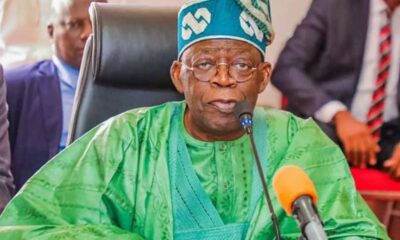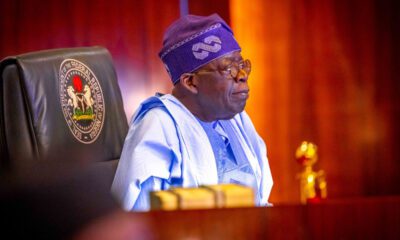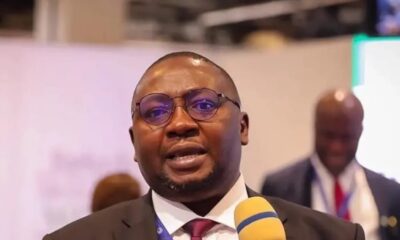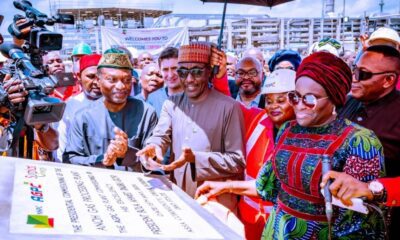Top Story
Supreme Court fixes Monday to hear Atiku, Obi appeal against Tinubu
The Supreme Court has fixed Monday to hear Atiku Abubakar and Peter Obi’s appeal against President Bola Ahmed Tinubu.
The Supreme Court on Thursday fixed Monday, October 23 for the hearing of the case.
Recall the PDP candidate, Atiku Abubakar on September 19 filed 35 grounds appeal challenging the verdict of the presidential election petitions which upheld Tinubu’s victory in the election.
The five-member panel headed by Justice Hassan Tsammani on September 6 dismissed the petitions filed by Atiku and his Labour Party counterpart, Peter Obi, for lack of merit.
The former Vice President had also applied to the Supreme Court to file fresh evidence obtained from the Chicago State University against the president.
Atiku has continued to insist that Tinubu’s academic records are fraught with discrepancies and forgery and asked the apex court to kick him out of office.
At the hearing next week, the Supreme Court will unveil a seven-member team that will adjudicate and determine the case.
In his appeal, Atiku’s lead lawyer, Chris Uche, anchored the suit on 35 grounds.
Mr Uche, a Senior Advocate of Nigeria (SAN), said the five-member panel of the presidential election court erred in their verdict.
In court filings at the Supreme Court, Mr Uche contended that the PEPC’s judgement occasioned “grave error and miscarriage of justice” in its legal reasoning by upholding Mr Tinubu’s election as president.
In the document dated 18 September, Mr Uche contended that the presidential election court failed to adequately evaluate his client’s evidence before reaching its conclusions.
The lawyer faulted the court’s use of “disparaging words” against Atiku which “evinced bias.”
In another ground of appeal, Mr Uche told the Supreme Court that the lower court’s conclusions “did not represent the true picture of the grounds of his petition.”
He further contended, among other issues, that the presidential election court erred in law when it “failed to nullify the presidential election held on 25 February 2023 on the grounds of non-compliance with the Electoral Act, 2022, when by evidence before the tribunal, INEC conducted the election based on grave and gross misrepresentation contrary to the principles of the Electoral Act 2022, based on the “doctrine of legitimate expectation.”
Meanwhile, Atiku filed fresh evidence at the Supreme Court concerning the academic records of Mr Tinubu which the former vice president obtained from Chicago State University in the United States.
Although the issue of Mr Tinubu’s academic records was dismissed by the presidential election court, Atiku intends to breathe fresh life into it since he obtained the documents from the U.S.
In September, a U.S. court ordered the Chicago State University to release Mr Tinubu’s academic records to Atiku despite the president’s vehement opposition to the release of his transcripts.
In Obi’s appeal at the Supreme Court, his lawyer, Livy Uzoukwu, filed 51 grounds in challenging the presidential election court’s judgement.
Mr Uzoukwu, a SAN, argued that PEPC reached the wrong conclusions.
In one of the grounds, Mr Uzoukwu told the Supreme Court that the five-member panel of the Presidential Election Petition Court led by Haruna Tsammani “erred in law and thereby reached a wrong conclusion” when it dismissed Mr Obi’s suit.
He faulted the presidential election court’s evaluation of Mr Obi’s evidence. He said the court erroneously ruled that Mr Obi’s case failed to establish the polling stations where electoral malpractices took place during the February presidential election.
The lawyer also said the lower court’s conclusions caused a “grave miscarriage of justice” when it held that Mr Obi did not identify the specific number of votes he polled at polling units where he accused INEC and Mr Tinubu of suppression of votes.
The appellant’s lawyer urged the Supreme Court to determine if the presidential election court did not err in law when it based its reasons on the First Schedule of the Electoral Act 2022 to expunge Mr Obi’s witnesses’ statements on oath from the court’s records.
Some of Mr Obi’s key witnesses whom the five-member panel of the court dismissed their testimonies were a web engineer, Mpeh Ogar; and a statistician, Eric Uwadiagwu.
Mr Obi and Atiku had filed separate petitions at the PEPC accusing Nigeria’s electoral umpire, INEC, and Mr Tinubu of electoral malpractices. They contested Mr Tinubu’s qualification to stand for election and begged the PEPC to set aside the election.
But the court, in its decision, held that they failed to prove their claims of electoral fraud against INEC and the president. Another political party, APM, lodged the third suit alleging improper nomination of Mr Tinubu’s running mate and incumbent Vice President Kashim Shettima.
In its appeal at Supreme Supreme, APM’s lawyer, Chukwuma–Machukwu–Ume, a SAN, predicated his client’s suit on 10 grounds.
Mr Machukwu-Ume, a SAN, prayed the apex court to nullify the presidential election court verdict for its numerous errors in law.
He argued that sections 131 and 142 (1) of the 1991 Constitution are inextricably linked and neither can be confined as a pre-election matter, as these qualifications are conditions precedent to, for being elected into the office of President.
APM’s suit was not based solely on nomination, but primarily that President Tinubu contested the presidential election without a lawful running mate.
The party added that the withdrawal of Ibrahim Kabir Masari, a place-holder and the expiry of the 14 days permissible for changing and withdrawing of dead candidates under Section 33 of the Electoral Act 2022, rendered Mr Tinubu’s election and return, invalid.
Mr Tinubu, INEC and other respondents in the suits have urged the apex court to dismiss the appeals for being un-meritorious.
Mr Tinubu’s lawyer, Wole Olanipekun, a SAN, said Atiku and Mr Obi failed to prove all their allegations at the PEPC.
He said the court was right in arriving at its decision affirming Mr Tinubu’s victory.
Top Story
Account enrollment: Court validates CBN’s regulation, permits collection of customers’ social media handles


…Dismisses concerns, says social media handles not protected by privacy rights
…Financial institutions cleared to collect social media handles for KYC
By Sodiq Adelakun
The Federal High Court in Lagos has ruled in favour of the Central Bank of Nigeria (CBN) in a case challenging the regulation that requires financial institutions to collect their customers’ social media handles as part of the Know-Your-Customer (KYC) procedure.
Recall that the Socio-Economic Rights and Accountability Project (SERAP) had urged the court to compel CBN to withdraw its directive to banks and other financial institutions.
However, in the ruling, Justice Nnamdi Dimgba struck out the suit filed by Lagos-based lawyer, Chris Eke, who argued that the regulation violates the right to privacy of bank customers.
Eke had sought a declaration that the regulation contained in Section 6(a) (iv) of the Central Bank of Nigeria (Customer Due Diligence) Regulations, 2023, is undemocratic, unconstitutional, null, and void, as it contradicts Section 37 of the 1999 Constitution of the Federal Republic of Nigeria (as amended). However, Justice Dimgba ruled that the regulation does not breach the right to privacy of bank customers.
The CBN regulation is targeted to enhance customer due diligence and anti-money laundering measures, and requires banks to collect social media handles, among other personal information, from their customers.
The applicant had asked the court to grant an order of perpetual injunction, restraining CB from enforcing the regulation which requires financial institutions to request customers’ social media handles as part of normal bank customer due diligence requirements.
The CBN in its response to the suit, filed a notice of preliminary objection, challenging the competence of the suit. The apex bank also disagreed that the said regulation constitutes any interference with the private life of the applicant, as claimed.
The judgment came as Justice Dimgba dismissed a suit, stating that the notice of preliminary objection held merit and consequently struck out the case.
During the proceedings, Justice Dimgba emphasised that providing a social media handle is akin to furnishing email addresses, phone numbers, and other contact details for banking purposes.
He argued that such information aids in conducting due diligence to ascertain if an individual is suitable for conducting business with a bank.
Justice Dimgba further explained that the essence of having a social media account implies a willingness to engage in public communication, thus rendering privacy concerns unfounded.
According to him, “First, the Applicant claims that the requirements on the CBN Regulations for financial institutions to request and collect the social media handle of its customers as part of KYC infringes on his right to privacy.”
“This claim is very ambitious and amounts to a very far throw. The said Regulations are directed to and apply to financial institutions. It does not apply to private individuals such as the Applicant.
“Even if, as appears to be argued, that the Regulations itself would inevitably affect the Applicant, this claim is speculative for the simple reason that in nowhere in the affidavit in support was it stated that the Applicant operates an account with a financial institution and that the said institution had demanded his social media handle. So the suggestion that he would be affected by this Regulation, albeit negatively, is very speculative and at large.
“Secondly, there is also no deposition to the effect that any financial institution had begun to implement this Regulation and that its implementation had begun to create disruptions and inconvenience against the general population, in which case one could infer that the suit should be legitimated as a public interest litigation.
“Thirdly, assuming even that the banks had begun to implement these regulations, the applicant assuming he maintained any bank accounts or sought to open one, but is being hindered or irritated by the requirement of the Regulation to avail his social media handle as part of KYC, the Applicant still had a choice, which is to refuse to do business with any bank insisting on the information as part of its social media handle, but to seek other alternatives.
“Fourthly, and for all it is worth, I do not see how asking a banking or potential banking customer to provide his social media handle can ever amount to a breach of privacy.
“Granted that Section 37 of the Constitution of the Federal Republic of Nigeria 1999 (as amended) provides inter alia: The privacy of citizens, their homes, correspondence, telephone conversations and telegraphic communications is hereby guaranteed and protected.
“My view is that the provision of a social media handle is of the same genre as the provision of email address, phone numbers and other means by which a potential customer of a bank can be contacted.
“Thus, it is clear from the face of the Regulations as set out above that email addresses, phone numbers and social media handles are all provided for under clause 6iv just to show that the aim was not to pry on anyone but rather to provide alternative ways by which a customer of the bank can be contacted, and or due diligence conducted on the person to determine if the person is a fit and proper person to extend banking services to.
“I do not see how this infringes on the right to privacy. I should even say that the essence of having a social media account was for one to be publicly visible communication-wise. It, therefore, appears quite ironic, though wryly, that one can suggest that asking for information about a social media handle with which the individual exposes and immerses himself or herself in the public, can amount to a violation of privacy rights, which rights itself is all about isolation of one from public glare.
“It is also to my knowledge that even in filling some business applications, personal information of this sort, is sometimes requested, and parties generally oblige. If it does not constitute a breach of privacy, why should it now?
“A social media handle is left at large for the world to see, being in the public space, everyone enjoys the liberty to have access to it whether or not consent was obtained. It would be highly unreasonable to hold the Respondent in breach of privacy for what other persons have access to.
“The apprehension of the Applicant of his social interactions being monitored is manifestly speculative in itself and rather incredulous to believe that the financial institutions have the luxury of time to concern itself with such frivolities.
“On the whole, if I did not sustain the NPO, I would have dismissed the suit for the reasons stated. But the NPO having been sustained, the suit is therefore hereby struck out.”
Top Story
N1.3trn power debt: Tinubu approves payment, unveils plan to liquidate gas debts


President Bola Ahmed Tinubu has given approval for the payment of N1.3trn legacy debts owed power generation companies.
Minister of Power, Chief Adebayo Adelabu speaking at the 8th Africa Energy Market Place 2024 in Abuja said that President Bola Tinubu has approved a plan to liquidate the debts.
According to him, “Mr. President has approved the submission made by the Minister of State Petroleum (Gas) to defray the outstanding debts owed to the gas supply companies to power generation companies. The payments are in two parts, the legacy debts and the current debts. For the current debt, approval has been given to pay about N130 billion from the gas stabilisation fund which the Federal Ministry of Finance will pay.”
“The payment of the legacy debt will be made from future royalties in exchange for incomes in the gas subsector which is quite satisfactory to the gas suppliers. This will allow the companies to enter into firm contracts with power generation companies.
“For the power generation companies, the debt is about N1.3 trillion and I can also tell you that we have the consent of the President to pay, on the condition that the actual figures are reconciled between the government and the companies. This we have successfully done and it is being signed off by both parties now. Majority has signed off and we are engaging to ensure that we have 100 percent sign off.
“The debt will be paid in two ways, immediate cash injection and through a guaranteed debt instrument, preferably a promissory note. This assures the companies that in the next three to five years, the government is ready to defray these debts.”
The Minister further stated that the government was working to get the distribution companies solvent and effective by unbundling their operations along state boundaries.
He insisted that the areas covered by the current DisCos were too large for them to deliver effective services to consumers.
In the same vein, the Chairman of the Nigerian Electricity Regulatory Commission (NERC), Engr. Sanusi Garba lamented the poor financial state of the DisCos, noting that it is difficult for them to raise the needed capital to invest.
Engr. Garba pointed out that the challenges facing the sector were a culmination of all past inactions and missteps by those saddled with the responsibilities of managing the sector both at policy and operational levels.
According to him, “Today when you look at distribution companies they are clearly and technically insolvent, and you also want them to raise capital in terms of debt or equity. It’s a Herculean task. I also want to mention that implementing the power sector reform requires very strong political will to implement decisions that impact on the wider public.”
However, the African Development Bank (AfDB) disclosed that it has so far spent over $450 million to support various power sector projects and programmes with another $1 billion planned to support the power sector reform effort by the government.
Top Story
Emirates Airline to resume Lagos-Dubai flights October 1


Emirates Airline has disclosed that it will resume services to Nigeria from October 1, 2024, operating a daily service between Lagos and Dubai.
This development was announced in a statement on Thursday by the airline, which has its hub in the United Arab Emirates (UAE).
The airline disclosed that flight services will be operated using a Boeing 777-300ER.
“We are excited to resume our services to Nigeria. The Lagos-Dubai service has traditionally been popular with customers in Nigeria and we hope to reconnect leisure and business travellers to Dubai and onwards to our network of over 140 destinations.
“We thank the Nigerian government for their partnership and support in re-establishing this route and we look forward to welcoming passengers back onboard,” Emirates’ Deputy President and Chief Commercial Officer, Adnan Kazim, said.
Recall that Emirates Airlines had suspended its Dubai-Lagos flights in 2022 over its inability to repatriate trapped funds in Nigeria in the heat of the diplomatic row between the two countries.
This comes after Festus Keyamo, Minister Of Aviation And Aerospace Development in a post on his X (formerly Twitter) page had disclosed that he got correspondence from Emirates Airline when he visited Salem Saeed Al-Shamsi, ambassador of the United Arab Emirates (UAE) in Abuja.
”Yesterday, I paid a working visit to the Ambassador of the UAE to Nigeria, His Excellency, Salem Saeed Al-Shamsi at the UAE Embassy in Abuja. He handed me a correspondence from the Emirates Airline indicating a definite date for their resumption of flights to Nigeria,” Keyamo said.
-
Finance4 months ago
Court orders Sen. Victor Umeh to repay N136m bank debt to AMCON
-



 Abuja Update3 months ago
Abuja Update3 months agoUNDP, FG partnership needed to achieve inclusion, equity- Minister
-
Abuja Update2 months ago
Banks drive stock market performance with N147bn gain
-
capital market2 years ago
Rt.briscoe, FBNH, Others halts negative performance of stock market
-
Submission Guidelines4 months ago
CALL FOR SUBMISSIONS: POETRY COLUMN-NND
-



 Health1 month ago
Health1 month agoCapacity training will reduce migration of health workers- NPHCDA
-



 Business4 weeks ago
Business4 weeks agoTingo Group unveils Tingo Electric, Tingo Cola drink at Lagos launch
-
News4 months ago
Oil thieves sponsoring malicious media campaign against Navy – Spokesman















